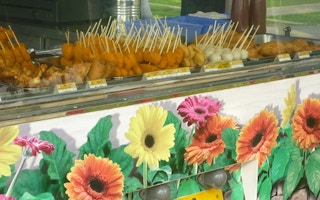Over 20,000 people of all ages streamed into Singapore’s Marina Barrage on Sunday as part of a green event billed by organizers as “zero waste”.
The non-governmental organization Singapore Environment Council (SEC) hosted the Singapore G1 2012 walkathon and festival to raise awareness and to show that such mass gatherings could have minimal environmental impacts, said SEC executive director Jose Raymond at the event.
While the day was not completely waste-free, the organizers decided to set the bold “zero waste” target as an example for the thousands of events hosted in Singapore each year, noted Mr Raymond.
“Today we’ve proven that by using the right materials and the right partners for a massive event like this, we can get our message across, get thousands of people under one roof, and still have a good time,” he said.
He added that he would like to see Singapore hold the region’s first green Southeast Asian Games when it hosts the games in 2015.
With about 15,000 participants, SEA Games organizers could do much to make the event more sustainable, including using electric transport, green hotels and sustainable building materials, he explained.
SEC has already received expressions of interest from events companies that manage other high profile events, said Mr Raymond, although he declined to provide details. He added that SEC would reach out to as many events organizers as possible to reduce the environmental impacts of Singapore’s events.
Organizers of the outdoor Singapore G1 event considered the waste impacts at every step of planning, from advertising to signage to food and beverage provision, he said. They used recyclable and reusable materials and packaging wherever possible, he added.
Independent auditors will assess the event for its environmental impacts - including waste and energy for a report to be released within two-weeks.
SEC chose event partners and vendors with a history of sustainability initiatives, and worked with them on ways to further reduce the amount of waste they generated, said Mr Raymond.
For example, Old Chang Kee – known for its food stalls that sell curry puffs and other snacks – sold its snacks at the event without plastic bags. The snack stand used only packaging that is recyclable or made from corn-based plastic.
Old Chang Kee sales manager Daniel Ong told Eco-Business at the event that customers at Singapore G1 were fully supportive of the reduced packaging, but he acknowledged that not all customers who frequent the 80 food stalls located throughout Singapore were as accepting.
Nonetheless, the snack stand continues to take small steps to reduce waste at all locations such as using only one bag for multiple food items, rather than packing each snack individually, said Mr Ong.
He also noted that the food vendor reused its waste cooking oil to produce biofuel. Local cooking oil recycler Alpha Biofuels collects the oil and turns it into biodiesel, which Old Chang Kee purchases to fuel its mobile snack stand (pictured), he explained.
The Singapore G1 event also highlighted energy and water efficiency, and featured the launch of the National Climate Change Secretariat’s Green Home Exhibit by Deputy Prime Minister Teo Chee Hean.
NCCS will display the Green Home Exhibit at schools, libraries, malls and other public spaces to raise awareness about climate change and its impacts on Singapore residents and businesses.
“For many, the issue of climate change seems very far away,” said Mr Teo. He explained that every individual can do small things to make a difference.
Regarding waste and consumption, he noted that Singapore is a much more consumerist society than it used to be.
“We have to find green ways of consuming,” he added.










